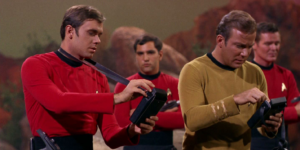Hello internet. Welcome to my inaugural book review here at Circle of Nerds. My job is simple: I read a lot of speculative fiction and I’ll do my best to let you know what I think is worth reading. My literary interests are wide-ranging, from Victorian Lit (Charles Dickens can craft a sentence like no one else) to what many in my professional circles would turn their noses up at and undoubtedly call “schlock.” Well I’ve never been one of the elites and I don’t pretend to like things just to impress people and that is especially true with what books I read. Put simply, I like what I like. So, what did I like this week?
Redshirts, by John Scalzi. Published by TOR.

You know the scenario. Kirk, Spock, Bones, and an extra in a red shirt beam down to the surface of an unexplored planet at the beginning of an episode of Star Trek. In order to provide dramatic tension and create the illusion that the situation the main characters are in is dangerous, the extra with the red shirt will likely die a horrible death, giving the senior officers time to escape the same fate. According to wikipedia (I know, I should really do my own research) 43 of the 59 crew members killed off in the original Star Trek series were wearing red Starfleet uniform shirts. This was such a frequent occurrence on the show that the term “redshirt” has come to be defined as any stock character in a fictional show that dies shortly after being introduced in order to cheaply augment the suspense of a scene.

In Redshirts, John Scalzi subverts this trope by giving those expendable extras something they never had – agency. In this story, they are at the helm. Ensign Andrew Dahl is excited to be given what appears to be a prestigious assignment: a post in the xenobiology department aboard the Universal Union Capital Starship Intrepid, flagship of the Dub U. It’s the year 2465 and the mission of the Intrepid is to, dare I say it, explore strange, new worlds. Yes, the universe this story is set in is a cheap knock-off of Star Trek. That’s not a criticism, it’s actually an essential plot point. Ensign Dahl finds out very quickly that something is “monumentally fucked up” about the ship. Veteran redshirts seem to have an uncanny ability to disappear whenever senior officers show up looking for “volunteers” for away missions, there’s a magic box that can defy all known laws of science to miraculously cure any of those senior officers who might come down with a unknown alien disease, and then there’s the body count. Nearly every away mission leads to the death of a non-essential, red-shirt-wearing, crew member. Not wanting to accept his inevitable fate without a fight, Ensign Dahl begins to dig deeper into the mystery and, with the help of a wary old hermit who lives in the Intrepid’s air ducts, discovers an impossible truth that will lead him and his friends on a journey to claim something that has been denied to them their entire lives. Free-will.

How has this book escaped my radar? I had no idea this this existed until I was browsing Audible, searching for something interesting to spend my monthly credit on. I downloaded the audiobook of Redshirts for three reasons. First, I have a long commute to work and I love spending it listening to someone reading stories to me. Second, it’s read by Wil Wheaton who is freaking phenomenal. Seriously, the only way I got through Ready Player One was by listening to the Wil Wheaton audio. It’s clear he enjoys reading, and he puts real passion into it. The third reason I spent actual money on it was it had won the Hugo award in 2013 for best novel. I considered it a trifecta. Scalzi’s writing is solid. There’s no elegant prose, no beautiful metaphors or symbolism (other than the magic box I guess – literal deus ex machina), and I never once thought I needed to backtrack the audio to hear an exceptionally well-crafted sentence, but it has a wonderfully designed story, a perfectly paced plot structure, and likeable, if not somewhat homogenous, characters (although that may be an artifact of listening to an audiobook – all the characters sound exactly alike; or possibly intentional to highlight the idea that they are all glorified extras who shouldn’t have their own personalities. With this book, it’s complicated).
The narrative is remarkably meta. That self-referential quality becomes an essential part of the story, which ends by Scalzi throwing another layer of meta onto an already dangerously saturated tale. But, it kind of ends up being perfect. I won’t give anything away, but I will say, if The Darktower is Stephen King’s ego book, Redshirts is John Scalzi’s.
The book is not without its flaws, however. Scalzi uses “said” as a dialogue tag so often it’s jarring. Again, this is an effect of the audiobook version, as our brains tend to skip dialogue tags as we read, but we can’t skip them when we are listening to someone read. Still, using “said” 17 times on a single page is a bit much. Which is even more tragic considering Scalzi’s dialogue game is on point.
Also, the three codas at the end are, like the redshirts themselves, non-essential. They deal mostly with the fate of some of the incidental side characters and they are not as well written as the main book. It is interesting that the codas focus on the minor characters in a book about minor characters as the main characters and, well, see? I told you it was meta. If you are the kind of person who watches all the bonus features and commentaries when you buy a movie, you may still get a kick out of the codas. I know I did.
Redshirts is the sort of book that I read and come away asking myself, “now why did I think of that?” It’s a brilliant concept, executed with style. Sci-fi fans, especially Trekkers, are sure to enjoy. As long as you don’t take it too seriously.
